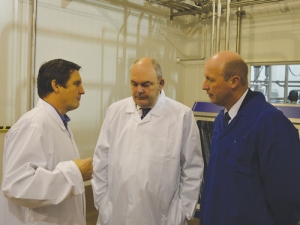Blue River Dairy eyes new markets after China success
Sheep infant nutrition maker Blue River Dairy is hoping to use its success in China as a springboard into other markets in future.
 Scottie Chapman, chief executive Spring Sheep Dairy, talks with Steven Joyce and Hamilton East MP David Bennett at the new plant last week.
Scottie Chapman, chief executive Spring Sheep Dairy, talks with Steven Joyce and Hamilton East MP David Bennett at the new plant last week.
Sheep milk has the potential to become a $200 million industry within 10 years, says Waikato Innovation Park chief executive Stuart Gordon.
A new $5 million FoodWaikato wet processing plant opened last week will help grow the sheep milk sector, he says.
One of its first sheep milk customers is Spring Sheep Dairy, a joint venture between Landcorp and businessman Scottie Chapman. The company will use the dryer to make value added sheep milk products for export.
Gordon says FoodWaikato is keen to help grow the sheep milk industry.
“There is a real opportunity to grow the industry to a $200m business. Spring Sheep Dairy is growing markets and supply, we will be manufacturing for them,” he told Rural News.
The new plant is expected to inject an extra $38.5m per year in export revenue back into the New Zealand economy from the sale of new, value-added consumer products directly produced there.
The first stage of the plant, a spray dryer, was opened in May 2012, funded by Innovation Waikato Ltd and a Government grant of $3.95m. It cost $12.8m to complete.
Gordon pointed to the success of the Hamilton Diary Goat Cooperative, which used the FoodWaikato dryer while building its second dryer.
“There is no reason why the sheep milk industry cannot achieve something similar to dairy goats,” he says.
“We try to get people to build markets and supply, at the same time providing bridging manufacturing facilities. We keep them going for three to four years and when they have enough market and supply, they set up their own plant and move on.”
Dairy Goat Co-op turned to FoodWaikato when its first 1 tonne/hour dryer reached capacity.
Gordon says Food Waikato allowed the co-pop to build its supply and markets and invest in a new dryer while helping with processing goat milk.
FoodWaikato’s second stage was largely funded by a $3m equity injection from Callaghan Innovation and is not just limited to milk processing. It allows specialty ingredients such as vitamins, minerals and oils to be wet blended with milk or fruit juice prior to being spray dried.
“The functional and regulatory constraint of the plant as it was, meant we were limited to processing liquids in the form they arrived in at the site, which created challenges for many of the target firms FoodWaikato was created to assist,” says Gordon.
“Higher value products like infant formula and aged care formula tend to involve mixtures of ingredients, but mixing offsite and transporting to FoodWaikato created regulatory, product integrity and processing challenges.
“So we have added ‘wetside’ processing capability that now allows the mixing process to be done onsite, meaning FoodWaikato can now provide a greater level of development and innovation capability to dairy companies – cow, goat and sheep – and to fruit and vegetable producers.
Mating wrapped up last month at the across-breed Beef Progeny Test on Pāmu’s Kepler Farm in Manapouri.
Libby Judson is a keeper of memories from an age gone by. Tim Fulton tells her story.
A New Zealand-first native tree study has highlighted the Bioeconomy Science Institute's position as a forestry research leader.
Hemp fibre processor Rubisco is relocating its core processing facility to Ashburton as part of a $20-$30 million expansion to leverage what it says is an accelerating global demand for sustainable and renewable fibres.
Tradition meets some of the latest in technology at the 2026 East Coast Farming Expo.
OPINION: Trade Minister Todd McClay and the trade negotiator in government have presented Kiwis with an amazing gift for 2026 - a long awaited and critical free trade deal with India.

OPINION: If the hand-wringing, cravat and bow-tie wearing commentariat of a left-leaning persuasion had any influence on global markets, we'd…
OPINION: With Winston Peters playing politics with the PM's Indian FTA, all eyes will be on Labour who have the…